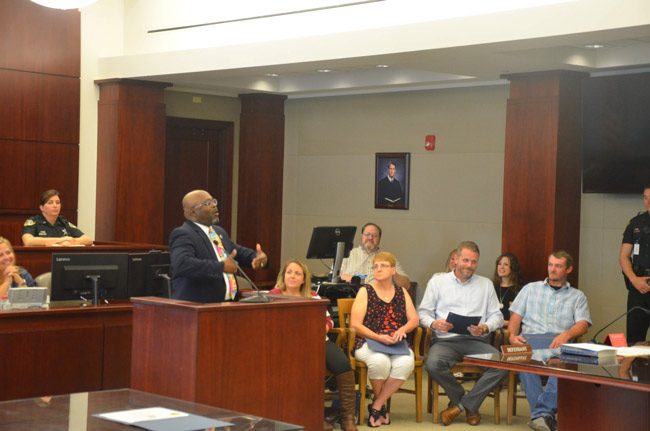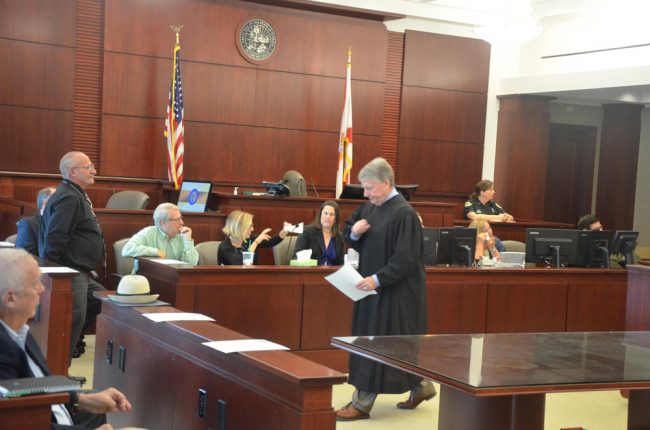
“I can’t remember how many of these graduations, commencements, I’ve been to, but every one is an emotional experience,” Mike Feldbauer, president of the Flagler County Drug Court Foundation, said toward the end of the 34th Drug Court commencement ceremony last week at the courthouse. “When we see the success stories it’s a real blessing. But we also see the other side.”
He wasn’t kidding. At one point at least three members of the drug court operation team were jostling for Kleenex, and Circuit Judge Terence Perkins, who was presiding over the session, seemed himself to be touching up his eyes here and there, as if to keep his composure. As for the audience: forget it. Tears often flow on that side of the courtroom, but usually for the most sorrowful reasons–a conviction, a harsh sentence, the unbearably vivid testimony of a crime retold.
This time it was all for joy as the more than two dozen members of drug court still in the grueling program sat on one side and families and friends sat on the other, cheering, whooping, calling out the names of the four graduates, and of course weeping for joy at their success.
They’re never small achievements, these graduations–or commencements, as the judge prefers to call them–and not just because of the strict and unrelenting hoops drug court participants have to go through. It’s the distance they’ve traveled, the heights they’ve scaled since their rock-bottom experiences.
One of them had been arrested on a probation violation while he was sitting in a counseling session at Break the Cycle, the drug-addiction treatment center in Bunnell and a drug court partner. He knew what was happening as soon as he saw a cop through a door. He gave someone in there a pack of cigarettes, his hat and sunglasses before stepping out. There was meth in the cigarette pack. Another was crying hysterically and telling a cop she was a crack addict and had just traded a gun for crack when she was arrested. A third was drunk when he was arrested for felony child abuse and domestic violence involving his fiancee and his 15-year-old daughter. And the fourth sold cocaine to someone who turned out to be a sheriff’s informant.
But they’ve traveled so far that some of them now see their captors as saviors, as did Tara Williams, 35, who had been arrested by the sheriff’s Frank Gamarra. Gamarra was now in the audience, hearing words he doesn’t often hear from those he’s busted and seen at their worst.
“Detective Gamarra I want to thank you. None of this would be happening today if you hadn’t come in my life and changed my life,” Williams said of that day on April 27, 2016. “I know some people look at arrests and they’re like, oh man, why is this happening and they hate the cops for it, but I thank you, I genuinely thank you, because you saved my life.”
Each of the graduates spoke in turn–Chad Dennis Jr., Pamela Guth, Alex Lape, each thanking a support system that stood by them as they went through the year to two-year process in drug court.

Perkins himself had reserved a few words for each, reminding them and the audience that even commencement ceremonies in drug court are official drug court sessions. One of the accomplishments at Thursday’s ceremony was the court’s ruling that the charges against each of the defendants would not be prosecuted. That’s part of the deal in drug court–if it’s completed.
“There’s nothing you can’t do, there really isn’t, I can’t tell you how proud I am of you and I’m confident you’re going to be a success,” Perkins told one of the participants. “You’re a kind, loving, well-intended person, that’s who you were all along. It was a little bit buried, now it isn’t,” he told another.
The keynote speaker was Alvin Jackson, Bunnell’s relatively new city manager, who managed somehow to do a little upstaging with his own story. Keynote speakers from time to time reveal their own struggles with and conquests of addiction. County Commissioner Joe Mullins did so at the last graduation. Clerk of Court Tom Bexley did so a few years ago.
Jackson started his remarks by saying he did not have those struggles in his past, but he was affected by them. “I’m a living oxymoron. I’m a victim as well as a product,” Jackson told the graduates. He said when he was an infant his father was a drunk, and a violent one at that. When he was 8 months old his parents, he said, got into an altercation. His father drew a gun. His mother ran out, then back into the house, remembering her 8 month old. Jackson described his parents wrestling for the gun, and the gun going off. “It killed my father,” he said. “I became an orphan.”
His mother, he said, was not prosecuted for his father’s death, though for years he resented her for taking his life. Growing up as a young man, Jackson said he had “the remnants of my father, which was a quick temper, easily provoked, I was mad with my mother because I thought she had taken the life of my father, not knowing the truth.” Those elements taught him how to manage difficult situations, he said.
“What I want to say to you is that your attitude is your altitude,” he told the graduates, his voice now rising to a preacher’s pitch, “and that if you practice thinking positively and finding the good in every situation, you can climb high, you’ve got to be passionate about life, you’ve got to be passionate about the goals you set.”
“We got this wrong,” Perkins said of the program notes when Jackson was done. “We put Dr. Jackson instead of Rev. Jackson.” In fact, Jackson is a weekend preacher.
When Feldbauer spoke at the end of the ceremony, he pointed to a jar, empty at the time, to remind the audience that the Drug Court Foundation depends on donations to function (and to provide such things as the after-ceremony party that was to take place elsewhere in the courthouse). As people filed out, some of drug court’s participants were the first to seed the bowl with money.






























Concerned Citizen says
Congradulations to all of the recent drug court graduates.
I have mixed feelings about drug court. I think it’s a great program and I am glad to see there are opportunities for some of these folks to turn things around.
However drug use is typically a choice (not a mistake). And a poor one at that. And while making those choices if you committ a crime you should be held accountable for your actions.
I keep seeing that charges are dropped after completion of this program. What happens to the victims? Do they get a second chance at a normal life?
If I get robbed by someone high on dope why shouldn’t that person be brought to justice?
70's baby says
I give the county credit for coming together over issues like these, as well as people like Mr. Jackson giving a piece of himself to help others.
Kim says
God bless. What a hard-won accomplishment.
tulip says
People make mistakes in life and those that go to the diligence and work to correct those mistakes and become and can have a clean and sober life deserve much praise, consideration, and have a positive way to start over with their lives and do well.